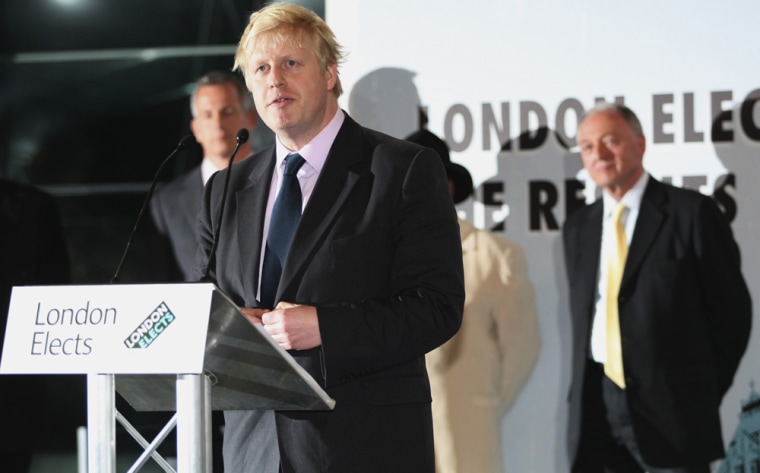An eccentric opposition Conservative lawmaker was elected as London's new mayor Saturday, heaping gloom on Britain's Prime Minister Gordon Brown, whose first test at the polls has brought his party's worst local election results in four decades.
After a decade-long wait to become his party's leader, Brown — dogged by accusations of dithering and incompetence — was forced to make a humble pledge to heed the scathing verdict from voters after his party lost London's City Hall and more than 300 municipal council seats.
His main political foe, opposition Conservative Party chief David Cameron, said his party's strong gains in the capital and in a longtime weak spot in northern England represented a key moment on the path to ousting Brown at the next national election.
No Conservative victory was more symbolic than in London, where former magazine editor Boris Johnson defeated Labour's incumbent Ken Livingstone.
First high-profile post since '97
Johnson becomes the first Conservative to hold a high-profile national post — controlling a budget of billions and charged with planning for the 2012 Olympics — since his party's thumping 1997 national election defeat by Labour, then led by Tony Blair.
Cameron hopes to be next and will square off against Brown in a national poll before mid-2010.
"I do hope it shows that the Conservatives have changed into a party that can again be trusted," Johnson said, shortly after the result was announced.
Johnson offered lavish praise for his rivals and paid tribute to Livingstone's role in guiding London through the 2005 transit network bombings. "Let's have a drink tonight, and let's get cracking tomorrow," Johnson told supporters, who cheered in delight as the results were announced.
An emotional Livingstone, the city's first ever elected mayor and in control since 2000, insisted the blame for his defeat must rest at his door, not Brown's.
Johnson's clownish charm
Usually uncombed and commonly unguarded, Johnson is best known for his wit — aired on frequent TV panel show appearances — but also for offending minority communities with unwise comments.
However, his clownish charm means many have forgiven his indiscretions and backed him over the equally maverick Livingstone.
London's ex-mayor was a staunch leftist who courted Venezuela's Hugo Chavez and frequently caused embarrassment to his party's national leadership. Johnson's often erratic outbursts meant he may have a similar relationship with Cameron.
Conservative officials said Johnson will step down as a House of Commons lawmaker within a year to focus on London, triggering a special election. Some predict his 67-year-old father Stanley Johnson, a former European legislator, will seek to replace his son.
Brown's poor results seem certain to embolden critics within his Labour party who fear the famously sullen ex-Treasury chief is leading his party back to the opposition benches.
His grip on power is faltering fast — in the last 12 months Labour has lost control of Scotland's regional government and London's City Hall.
"I think these results are not just a vote against Gordon Brown and his government," Cameron said Friday. "I think they are a vote of positive confidence in the Conservative Party."
'A disappointing night'
Brown didn't even attempt to put a gloss on his losses. "It's clear to me that this has been a disappointing night, indeed a bad night for Labour," he told reporters.
His electoral thrashing came as Blair — his predecessor, and longtime rival — reminded Britons of his polished statesmanlike credentials, leading talks in London on aid to the Palestinians and hosting U.S. Secretary of State Condoleezza Rice at his London home.
One Labour peer, Lord Desai, recently quipped that Brown's true role was to show his party how much they missed Blair.
Results from the 159 local councils which held ballots in England and Wales on Thursday showed the Conservatives gaining 260 seats with Labour losing 333. The Liberal Democrats gained 34 seats.
Most results were announced Friday, but a high turnout in London — where around 5.5 million cast ballots — meant the count there continued until early Saturday.
Conservatives 20 points ahead
The British Broadcasting Corp. projected the Conservatives would take 44 percent of the vote in England and Wales, putting it 20 points ahead of Labour. Brown's party was a point behind the Liberal Democrats, usually the country's third-largest party, according to the BBC.
Brown was credited with overseeing Britain's longest stretch of postwar prosperity and enjoyed a strong start as prime minister when he took the post in June. He claimed to represent substance after the slick Blair years, but a brief honeymoon with voters ended abruptly when he anguished over, and then ruled out, a snap national election in October.
Since then, grumbles over rising food and fuel prices, tax changes that have hit blue-collar workers and the costly nationalization of mortgage lender Northern Rock have conspired to send poll ratings for his Labour Party to a 20-year low.
However, Brown can take heart from recent history. His Labour Party followed disastrous municipal results in 2004 with a strong national election victory only a year later.
